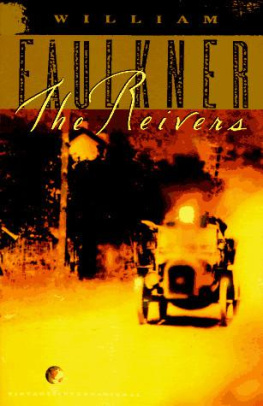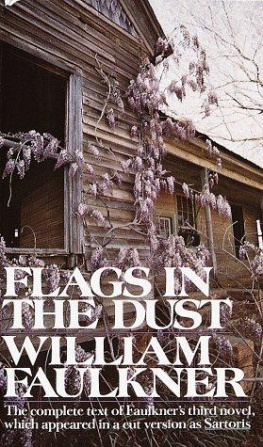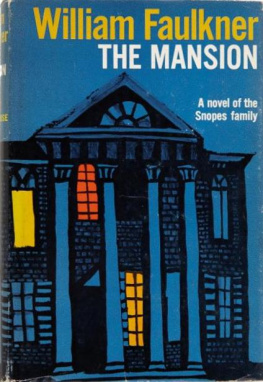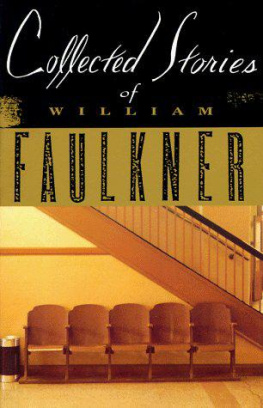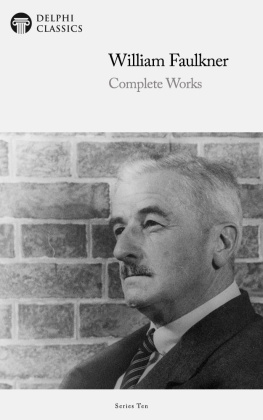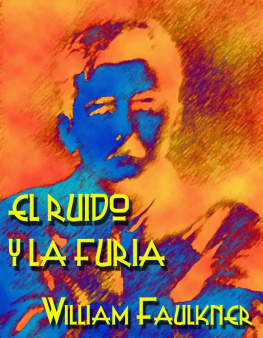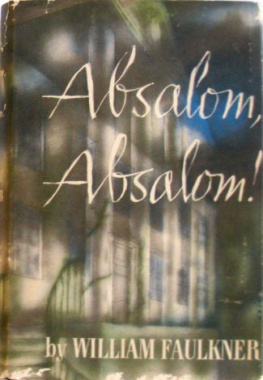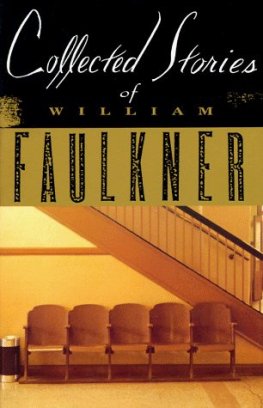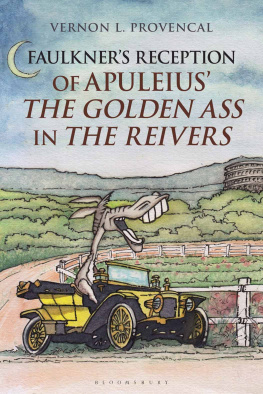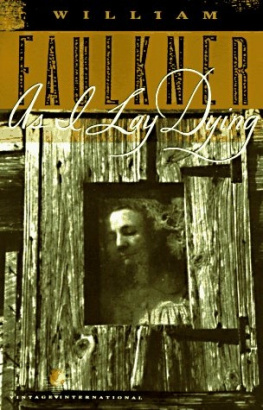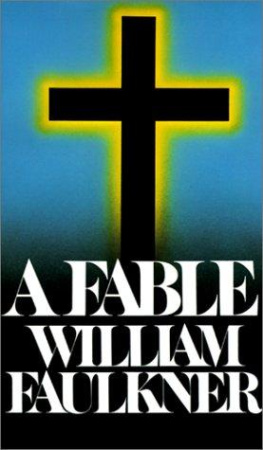William Faulkner - The Reivers
Here you can read online William Faulkner - The Reivers full text of the book (entire story) in english for free. Download pdf and epub, get meaning, cover and reviews about this ebook. year: 1992, publisher: Vintage, genre: Home and family. Description of the work, (preface) as well as reviews are available. Best literature library LitArk.com created for fans of good reading and offers a wide selection of genres:
Romance novel
Science fiction
Adventure
Detective
Science
History
Home and family
Prose
Art
Politics
Computer
Non-fiction
Religion
Business
Children
Humor
Choose a favorite category and find really read worthwhile books. Enjoy immersion in the world of imagination, feel the emotions of the characters or learn something new for yourself, make an fascinating discovery.
- Book:The Reivers
- Author:
- Publisher:Vintage
- Genre:
- Year:1992
- Rating:4 / 5
- Favourites:Add to favourites
- Your mark:
- 80
- 1
- 2
- 3
- 4
- 5
The Reivers: summary, description and annotation
We offer to read an annotation, description, summary or preface (depends on what the author of the book "The Reivers" wrote himself). If you haven't found the necessary information about the book — write in the comments, we will try to find it.
The Reivers — read online for free the complete book (whole text) full work
Below is the text of the book, divided by pages. System saving the place of the last page read, allows you to conveniently read the book "The Reivers" online for free, without having to search again every time where you left off. Put a bookmark, and you can go to the page where you finished reading at any time.
Font size:
Interval:
Bookmark:
THE REIVERS
William Faulkner
To Victoria, Mark, Paul, William, Burke
I
GRANDFATHER SAID:
This is the kind of a man Boon Hogganbeck was. Hung on the wall, it could have been his epitaph, like a Bertillon chart or a police poster; any cop in north Mississippi would have arrested him out of any crowd after merely reading the date.
It was Saturday morning, about ten oclock. Weyour great-grandfather and Iwere in the office, Father sitting at the desk totting up the money from the canvas sack and matching it against the list of freight bills which I had just collected around the Square; and I sitting in the chair against the wall waiting for noon when I would be paid my Saturday's (week's) wage of ten cents and we would go home and eat dinner and I would be free at last to overtake (it was May) the baseball game which had been running since breakfast without me: the idea (not mine: your great-grandfather's) being that even at eleven a man should already have behind him one year of paying for, assuming responsibility for, the space he occupied, the room he took up, in the world's (Jefferson, Mississippi's, anyway) economy. I would leave home with Father immediately after breakfast each Saturday morning, when all the other boys on the street were merely arming themselves with balls and bats and glovesnot to mention my three brothers, who, being younger and therefore smaller than I, were more fortunate, assuming this was Father's logic or premise: that since any adult man worth his salt could balance or stand off four children in economic occupancy, any one of the children, the largest certainly, would suffice to carry the burden of the requisite economic motions: in this case, making the rounds each Saturday morning with the bills for the boxes and cases of freight which our Negro drivers had picked up at the depot during the week and delivered to the back doors of the grocery and hardware and farmers' supply stores, and bring the canvas sack back to the livery stable for Father to count and balance it, then sit in the office for the rest of the morning ostensibly to answer the telephonethis for the sum of ten cents a week, which it was assumed I would live inside of.
That's what we were doing when Boon came jumping through the door. That's right.
Jumping. It was not really a high step up from the hallway, even for a boy of eleven (though John Powell, the head hostler, had had Son Thomas, the youngest driver, find, borrow, take--anyway, snaffle--from somewhere a wooden block as an intermediate step for me), and Boon could have taken it as he always did in his own six-foot-four stride. But not this time: jumping into the room. In its normal state his face never looked especially gentle or composed; at this moment it looked like it was about to explode right out from between his shoulders with excitement, urgency, whatever it was, jumping on across the office toward the desk and already hollering at Father: "Look out, Mr Maury, get out of the way," reaching, lunging across Father toward the lower drawer where the livery-stable pistol lived; I couldn't tell whether it was Boon lunging for the drawer who knocked the chair (it was a swivel chair on casters) back or whether it was Father who flung the chair back to make himself room to kick at Boon's reaching hand, the neat stacks of coins scattering in all directions across the desk and Father hollering too now, still stomping either at the drawer or Boon's hand or maybe both:
"God damn it, stop it!"
"I'm going to shoot Ludus!" Boon hollered. "He's probably clean across the Square by now! Look out, Mr Maury!"
"No!" Father said. "Get away!"
"You wont let me have it?" Boon said. "No, God damn it," Father said.
"All right," Boon said, already jumping again, back toward the door and out of it. But Father just sat there. I'm sure you have often noticed how ignorant people beyond thirty and forty are. I dont mean forgetful. That's specious and easy, too easy to say Oh papa (or grandpa) or mama (or grandma), they're just old; they have forgotten . Because there are some things, some of the hard facts of life, that you dont forget, no matter how old you are.
There is a ditch, a chasm; as a boy you crossed it on a footlog. You come creeping and doddering back at thirty-five or forty and the footlog is gone; you may not even remember the footlog but at least you dont step out onto that empty gravity that footlog once spanned. That was Father then. Boon came jumping without warning into the office and almost knocked Father chair and all over, grabbling at the drawer where the pistol was, until Father managed to kick or stomp or whatever it was his hand away, then Boon turned and went jumping back out of the office and apparently, obviously, Father thought that was all of it, that it was finished. He even finished cursing, just on principle, as though there were no urgency anywhere, heeling the chair back to the desk and seeing the scattered money which would have to be counted all over now, and then he started to curse at Boon again, not even about the pistol but simply at Boon for being Boon Hogganbeck, until I told him.
"He's gone to try to borrow John Powell's," I said.
"What?" Father said. Then he jumped too, both of us, across the office and down into the hallway and down the hallway toward the lot behind the stable where John Powell and Luster were helping Gabe, the blacksmith, shoe three of the mules and one of the harness horses, Father not even taking time to curse now, just hollering "John! Boon! John! Boon!"
every three steps.
But he was too late this time too. Because Boon fooled him--us. Because John Powell's pistol was not just a moral problem in the stable, it was an emotional one top. It was a .41 caliber snub-nosed revolver, quite old but in excellent condition because John had kept it that way ever since he bought it from his father the day he was twenty-one years old. Only, he was not supposed to have it. I mean, officially it did not exist. The decree, as old as the stable itself, was that the only pistol connected with it would be the one which stayed in the bottom right-hand drawer of the desk in the office, and the mutual gentlemen's assumption was that no one on the staff of the establishment even owned a firearm from the time he came on duty until he went back home, let alone brought one to work with him. Yetand John had explained it to all of us and had our confederated sympathy and understanding, a unified and impregnable front to the world and even to Father himself if that unimaginable crisis had ever arisen, which it would not have except for Boon Hogganbecktelling us (John) how he had earned the price of the pistol by doing outside work on his own time, on time apart from helping his father on the farm, time which was his own to spend eating or sleeping, until on his twenty-first birthday he had paid the final coin into his father's hand and received the pistol; telling us how the pistol was the living symbol of his manhood, the ineffaceable proof that he was now twenty-one and a man; that he never intended to, declined even to imagine the circumstance in which he would ever, pull its trigger against a human being, yet he must have It with him; he would no more have left the pistol at home when he came away than he would have left his manhood in a distant closet or drawer when he came to work; he told us (and we believed him) that if the moment ever came when he would have to choose between leaving the pistol at home, or not coming to work himself, there would have been but one possible choice for him.
So at first his wife had stitched a neat strong pocket exactly fitting the pistol on the inside of the bib of his overalls. But John himself realised at once that this wouldn't do. Not that the pistol might fall out at some irretrievable moment, but that the shape of it was obvious through the cloth; it couldn't have been anything else but a pistol. Obvious not to us: we all knew it was there, from Mr Ballott, the white stable foreman, and Boon, his assistant (whose duty was night duty and so he should have been at home in bed at this moment), on down through all the Negro drivers and hostlers, down to the last lowly stall cleaner and even to me, who only collected the Saturday accumulation of freight bills and answered the telephone. On even to old Dan Grinnup, a dirty man with a tobacco-stained beard, who was never quite completely drunk, who had no official position in the stable, partly because of the whiskey maybe but mostly because of his name, which was not Grinnup at all but Grenier: one of the oldest names in the county until the family went to seedthe Huguenot Louis Grenier who crossed the mountains from Virginia and Carolina after the Revolution and came down into Mississippi in the seventeen nineties and established Jefferson and named itwho (old Dan) lived nowhere (and had no family save an idiot nephew or cousin or something still living in a tent in the river jungle beyond Frenchman's Bend which had once been a part of the Grenier plantation) until he (old Dan) would appear, never too drunk to drive it, at the stable in time to take the hack to the depot and meet the 9:30 P.M. and the 4:12 A.M. trains and deliver the drummers to the hotel, or on duty all night sometimes when there were balls or minstrel or drama shows at the opera house (at times, at some cold and scornful pitch of drink, he would say that once Greniers led Yoknapatawpha society; now Grinnups drove it), holding his job, some said, because Mr Ballott's first wife had been his daughter, though we in the stable. all believed it was because when Father was a boy he used to fox hunt with old Dan's father out at Frenchman's Bend.
Next pageFont size:
Interval:
Bookmark:
Similar books «The Reivers»
Look at similar books to The Reivers. We have selected literature similar in name and meaning in the hope of providing readers with more options to find new, interesting, not yet read works.
Discussion, reviews of the book The Reivers and just readers' own opinions. Leave your comments, write what you think about the work, its meaning or the main characters. Specify what exactly you liked and what you didn't like, and why you think so.

